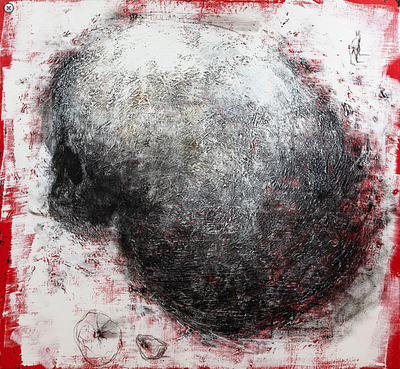"ANZO" JOSÉ IRANZO ALMONACID (Utiel, Valencia, 1931 - 2006). Untitled. Mixed media on paper adhered to cardboard. Signed in the lower right corner
Lot 114
About Seller
Setdart Auction House
Carrer Aragó 346
Barcelona
Spain
Setdart Subastas was born in 2004 and is currently the first online art auction in Spain with solidity, prestige and reliability guaranteed by our more than 60,000 users. Setdart has a young, dynamic and enterprising team ready to successfully manage the purchase and sale of art works through custom...Read more
Categories
Estimate:
EUR€4,000 - EUR€5,000
$4,166.67 - $5,208.33
Absentee vs Live bid
Two ways to bid:
- Leave a max absentee bid and the platform will bid on your behalf up to your maximum bid during the live auction.
- Bid live during the auction and your bids will be submitted real-time to the auctioneer.
Bid Increments
| Price | Bid Increment |
|---|---|
| EUR€0 | EUR€10 |
| EUR€200 | EUR€25 |
| EUR€500 | EUR€50 |
| EUR€1,000 | EUR€100 |
| EUR€3,000 | EUR€200 |
| EUR€5,000 | EUR€500 |
| EUR€10,000 | EUR€1,000 |
| EUR€20,000 | EUR€2,000 |
| EUR€50,000 | EUR€5,000 |
About Auction
By Setdart Auction House
Oct 19, 2021
Set Reminder
2021-10-19 08:00:00
2021-10-19 08:00:00
America/New_York
Bidsquare
Bidsquare : CONTEMPORARY ART
https://www.bidsquare.com/auctions/setdart-auction-house/contemporary-art-7701
Setdart Auction House sofia@setdart.com
Setdart Auction House sofia@setdart.com
- Lot Description
"ANZO" JOSÉ IRANZO ALMONACID (Utiel, Valencia, 1931 - 2006). Untitled. Mixed media on paper adhered to cardboard. Signed in the lower right corner Attached certificate of authenticity issued by the artist's daughter. Provenance: Private collection of the artist. Measurements: 110 x 85 cm. Anzo made his first works known with the illustration of the mural diary of the Escolapios school, where he studied high school thanks to a scholarship. He attended the Escuela de Arte y Oficios in Valencia, and later moved to Barcelona to study architecture. In 1954, he returned to Valencia with the firm idea of definitively entering the plastic arts. Anzo belongs to that group of Valencian artists who emerged during the long Spanish post-war period, and who were trained in the midst of Franco's regime. Pop Art took on an increasingly predominant role in his artistic production. He began to experiment with different printmaking procedures, in a social framework clearly influenced by economic development accompanied by an inherent change in the cultural dynamics of the time. The fact of turning the world of everyday mass-media myths into a point of reference in his works opened a new artistic door in his production, in which television images would play a decisive role. Anzo thus became the introducer of pop art in Valencian artistic culture, and the maximum representative of the trend at a national level. The artist was driven by the need to combine science and art in order to assert a message about a reality that he embraced and from which his new creations drank. This new artistic dimension gradually led him away from Pop Art and towards what was known in Europe as "Mec Art". Enthusiastic about the use of the new media, Anzo began a series of paintings which he called "Aislamientos" (Isolations). In the 1980s he began what was to become his last stage. After definitively closing the latent struggle of his isolations, he began a new stage which he called "Lyrical Geometry". In the apparent coldness of the geometric lines, a poetic sensibility could be glimpsed, rediscovering colour and lyricism. His work is still linked to abstraction and offered an optimistic vision: "I believe that beauty arises from the balance between the mathematical and the lyrical". In 2003 he was awarded the Premio de las Artes Plásticas de la Generalitat Valenciana. Anzo had been retired from art for some years. The death of his wife and other personal circumstances plunged him into a process of introspection. Finally, a long illness ended his life in 2006. Anzo has had exhibitions in more than thirty countries around the world, as well as in most national capitals. His work can be found in various museums and well-known public collections, such as: Museo Español de Arte Contemporáneo (Madrid), Amsterdam Stedelijk Museum, Basel Kunstmuseum, Oslo Nasjonalgalleriet, New York Museum of Modern Art, Rio de Janeiro Museu de Arte moderna, Tel Aviv Museum, Ljubljana Moderna Galerija, etc.
- Shipping Info
-
In-house shipping available. Please inquire at admin@setdart.com.
-
- Buyer's Premium



 EUR
EUR CAD
CAD AUD
AUD GBP
GBP MXN
MXN HKD
HKD CNY
CNY MYR
MYR SEK
SEK SGD
SGD CHF
CHF THB
THB













